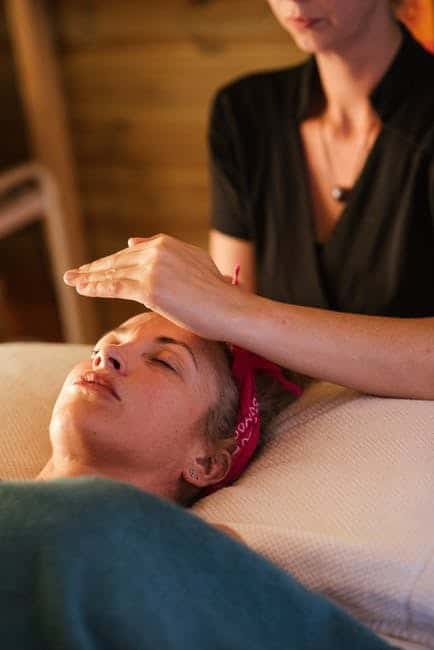At Villa Oasis San Diego, we offer plenty of treatment opportunities, from traditional to holistic. One of the many treatment options we offer is Reiki healing, a non-invasive stress reduction and relaxation technique. However, you might not know what Reiki healing is and the benefits of trying it.
What Is Reiki?
Reiki healing is a Japanese form of physical and spiritual therapy based on the belief that energy flows through the body. Reiki therapy can raise energy levels in a person and promote relaxation and wellbeing. Reiki combines two Japanese words, “Rei” and “Ki.” Rei means universal, and ki means lifeforce or energy.
Reiki arrived on the holistic scene due to the workings of Mikao Usui, who created this practice in the 1920s. The treatment is a complementary treatment to other forms of therapy. Many who try Reiki enjoy it because it is non-invasive and relaxing.
Reiki has risen in popularity over the years as an alternative therapy practice. More and more hospitals and treatment centers offer it as an alternative or complementary form of treatment.
How Does It Work?
The philosophy of Reiki is that when a person is stressed or unwell, their energy is low. When a person is feeling happy or well, that energy is high. Reiki aims to raise your energy level by helping you feel more relaxed and peaceful overall. The philosophy is based on the eastern idea that positive energy can support the body’s natural healing abilities.
What a Typical Reiki Session Looks Like
Reiki sessions depend on the practitioner, but commonly a person will lie on a massage table fully clothed. The Reiki practitioner will then place their hands in different positions on the body around the head, shoulders, stomach, and feet. The practitioner may keep their hands in the position for the amount of time necessary, which depends entirely on the flow of energy they feel. A typical Reiki session can last between 45 to 90 minutes.
Reiki doesn’t involve any massage, pressure, or joint manipulation. It only involves gentle touch. It can be expected for people in a reiki session to feel tingling, pulsing, or heat where the reiki practitioner’s hands are. These feelings can vary from person to person. It’s also common for a person to feel relaxed. People experiencing reiki might also fall asleep because they feel so comfortable and at ease.
Who Can Practice Reiki?
Reiki masters teach Reiki healing. Learning Reiki isn’t overly complicated, but it requires training to become a master of Reiki healing. Those who practice Reiki learn about the internal energy and how it changes based on a person’s current emotional state. They learn about the different pressure points of the body and where energy tends to settle. Those who master Reiki can understand why those energy spots are low and how to elevate them.
How Does Reiki Help Mental Health?
While there aren’t any studies that have been entirely conclusive that it can ease symptoms of mental health disorders, a study has shown Reiki was better than the placebo treatment. Reiki does have promise as a complementary treatment that can assist in the healing of mental health. The philosophical belief that energy can impact recovery could theoretically positively impact a person’s overall mental wellness.
The Benefits of Reiki
Reiki is best used as a complementary treatment. It can have many benefits for those interested in a form of therapy that can work well alongside other forms of treatment. Reiki healing can positively affect many aspects of a person’s life, including their energy level. Reiki also can be a very relaxing experience which can be especially helpful if a person experiences a lot of stress in their life. Reiki promotes harmony and balance, making it a vital form of therapy. One of the many reasons a person’s energy might be low is that it’s out of balance, and Reiki masters can help restore your energy flow.
Reiki can also release energy blocks. Those who try Reiki might find themselves clearer-headed and less tense. This positive development is due to their energy flowing better than before. They are no longer clouded by blocked energy. Their clearer mind makes it easier to focus and feel less overwhelmed with everything they need to do in their day.
Another benefit of Reiki is that it can help a person spiritually. A person might feel spiritually blocked. Releasing that energy and heightening it can help a person feel better on a spiritual level. They might feel a more positive attitude towards life after a Reiki session.
Holistic approaches allow for healing through multiple avenues. There are plenty of options for healing and recovery at Villa Oasis San Diego. We have numerous modalities that can help a person regardless of their needs and interests. You might have heard about Reiki before but don’t know how it can help you during the healing process that is an essential part of addiction and mental health treatment. There are no side effects to trying Reiki, and it can be a great addition to your treatment plan. If you are considering Reiki as a part of your treatment, don’t hesitate to call us for more information. We can talk to you about our Reiki practice, Villa Oasis San Diego’s very own Reiki master, and how they can assist you with healing. If you would like to learn more about this form of treatment, call us today at (323) 739-8673.




